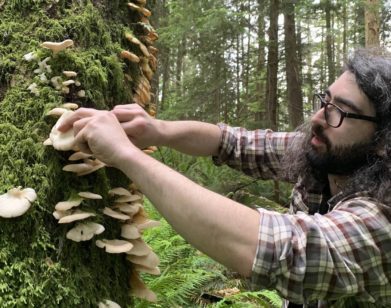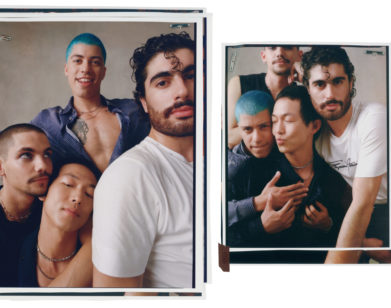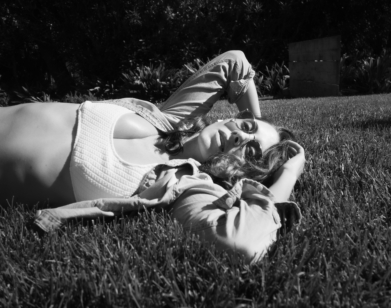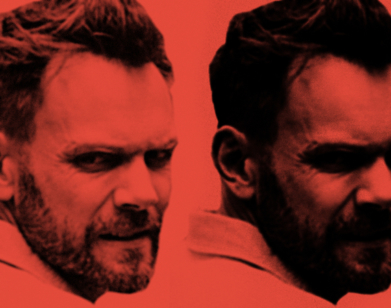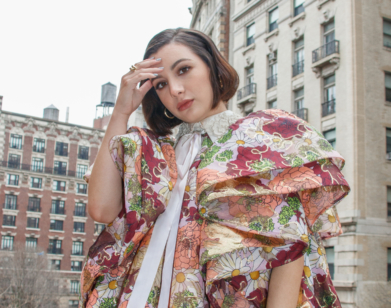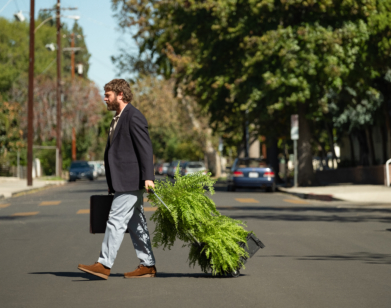school ties
Gillian Jacobs and Kris Rey Go Back to School
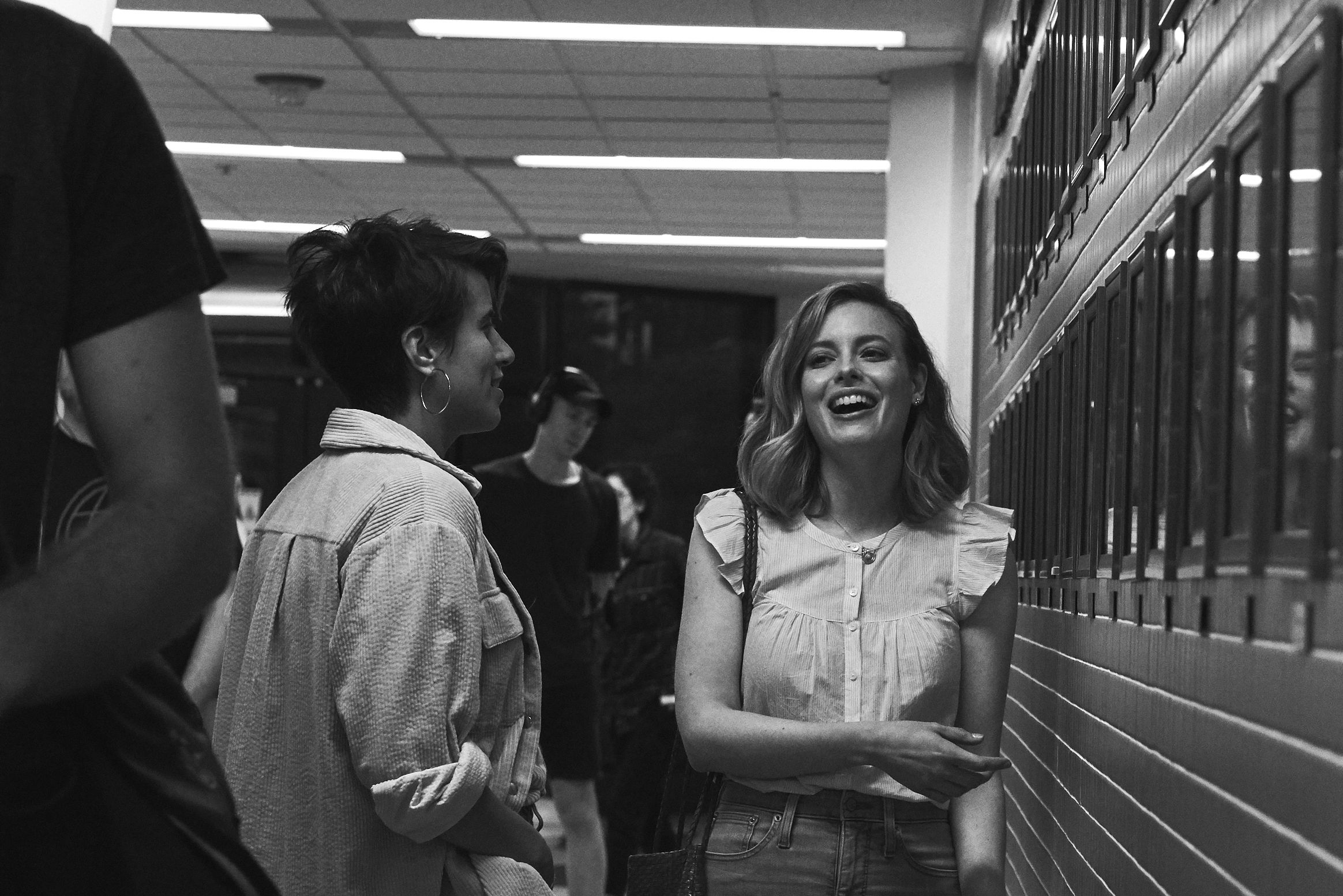
All photos courtesy Blair Todd.
There’s something specifically uncanny about a college reunion—the same smell of fresh-cut grass, tainted with the weariness of the adult world and the knowledge that you now get hangovers. For Kate, Gillian Jacobs’s character in Kris Rey’s new film I Used to Go Here—who returns to her alma mater to give a reading of her second-rate romance novel—add onto that a creepy former professor (Flight of the Conchords‘s Jemaine Clement), a draconian bed and breakfast owner, and a date with a slobbery couple that includes a former classmate named Bradley Cooper (no, not that one.) What saves Kate from drowning in a cesspool of existential dread is her unexpected bond with a group of shaggy-haired students, who lovingly embrace the 30-something writer. It’s a role practically written for Jacobs, the indie comedy darling of Community, Love, and just about every funny podcast ever made. With a signature blend of snark and earnestness, Jacobs is the literary millennial everywoman. Alongside alt-comedy veterans like Kate Micucci and The Lonely Island’s Jorma Taccone (one of the film’s producers), as well as a batch of college-aged newcomers, she climbs fences, fumbles for chargers, and regrettably texts her ex.
It was only a matter of time before Jacobs united with Rey, another artist who, with her good array of high-waisted pants and flair for irony, exists in the same gravitational orbit. While Jacobs is not necessarily a stand-in for the director, it’s Rey’s alma mater, the Southern University of Illinois at Carbondale, where the film largely takes place. As an actor on projects like Netflix’s Easy and Happy Christmas, and the director and writer of the indie films It Was Great, But I Was Ready to Come Home and Unexpected, Rey has made a career of examining the nuances of what it means to be an adult human. (She also, for the record, had a stint making artisanal ice cream after being laid off from her job in the Chicago Public School system.) In the spirit of reunions, Rey called up Jacobs to discuss moving forward by stepping back, whether it’s wearing clothes from 2005 or kissing (much) younger men.
———
KRIS REY: Did you prepare anything, Gillian? I can’t wait to see what we come up with.
GILLIAN JACOBS: Well, how about this: What’s a question you wish you had been asked, for all the questions we have
been asked?
REY: I don’t know. I feel like I have been asked that question, and I don’t ever know what to say. Sometimes people do ask questions that no one else has asked. Like, when we did that Q&A for the New York Women in Film thing, someone asked me about her [Jacobs’s character, Kate] coming back to Laura [her best friend, played by Zoë Chao] at the end of the movie. And I was like, “Oh, whoa! That’s a cool question that no one has asked.
JACOBS: Zoë is so phenomenal in this movie and in everything else that she does, and I wish we had gotten to all be together at some point to share this. The thing I keep saying to you is what a phenomenal cast I think you assembled, and that’s not me trying to compliment myself.
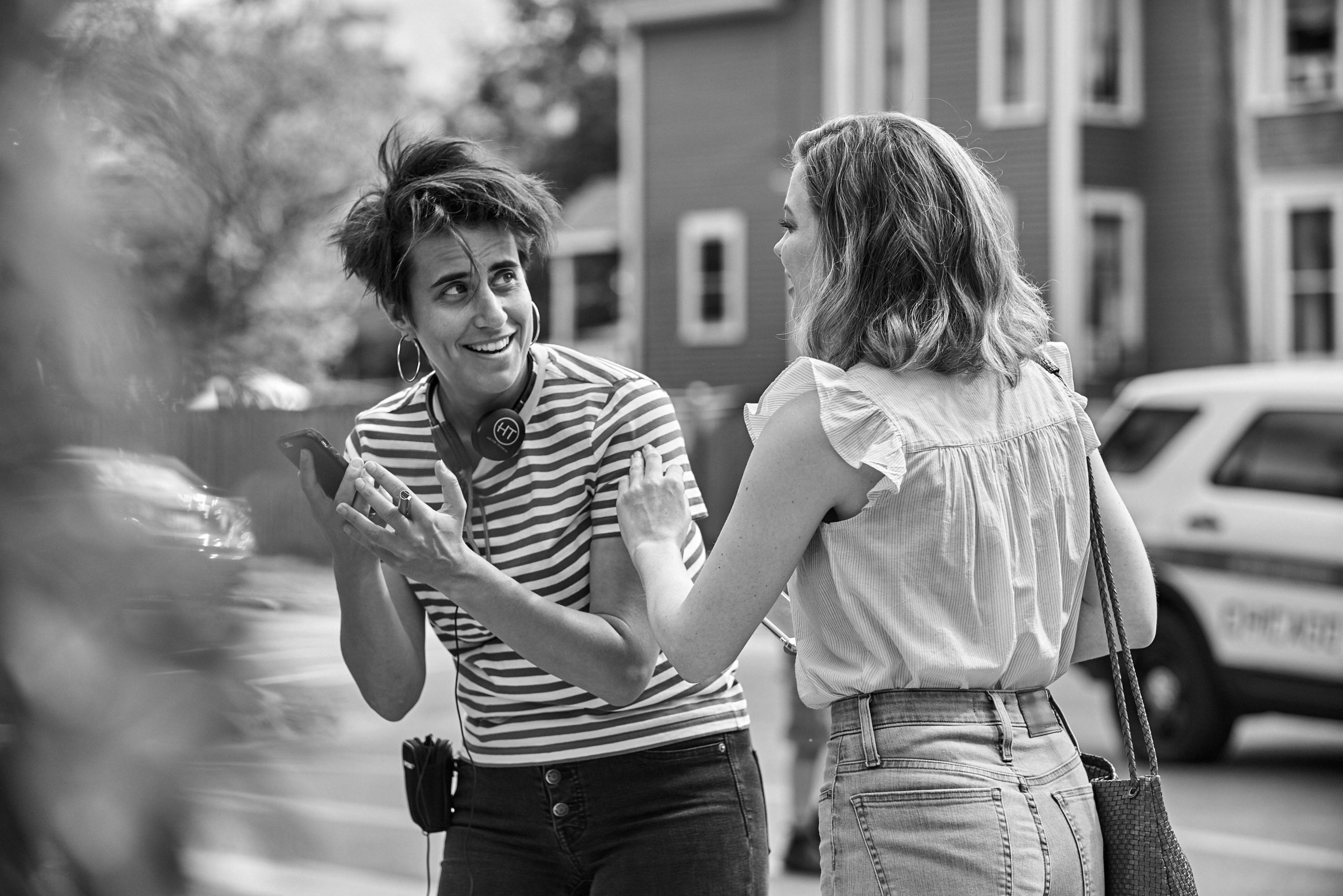
REY: It’s my favorite part of the whole thing. Well, it’s tied. The casting is my favorite part, and then my other favorite part is sound design. It just makes the movie so much better, and you don’t have to do anything. You’re just eating snacks at the back of the room, watching someone make your movie so much better.
JACOBS: Was there any part of it that was very different from how you envisioned it because of the casting?
REY: I think Josh Wiggins was so much younger-looking than I imagined the character of Hugo. I remember you and I talking about that during production.
JACOBS: I think you smartly wanted to cast people that actually were college-aged, which doesn’t happen all too often in film and TV.
REY: That’s true. He really does look 20 because he’s 20 years old.
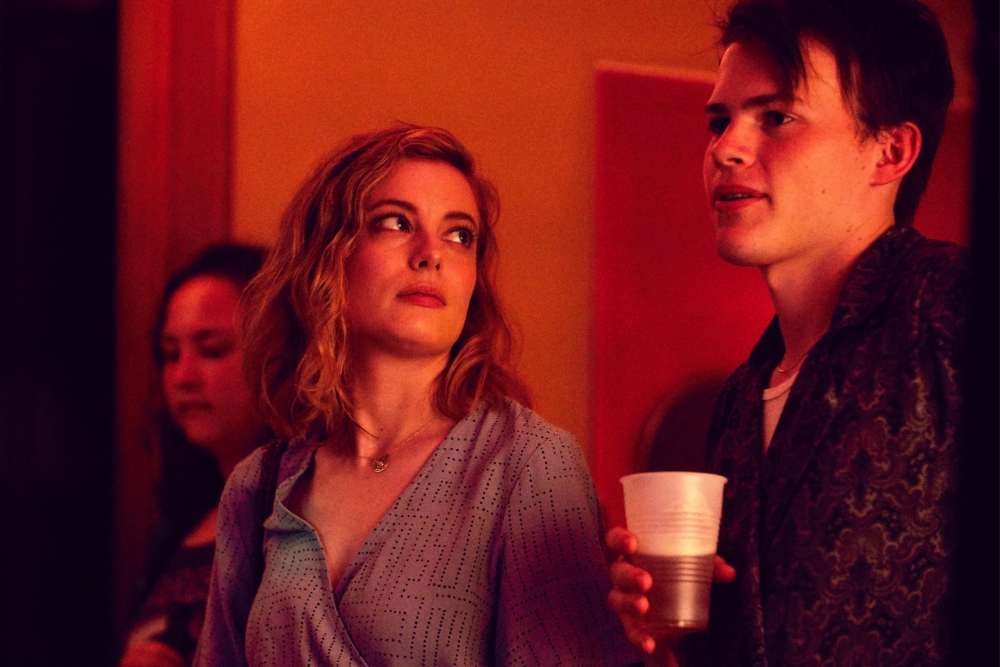
Gillian Jacobs and Josh Wiggins in I Used to Go Here.
JACOBS: And do you feel like that affected how the storyline played out between the two characters [Hugo and Kate]?
REY: I think it affected you. Don’t you, Gillian?
JACOBS: Oh my goodness. Well, yes! He’s significantly younger than me.
REY: I know!
JACOBS: It was very uncomfortable to have to kiss him.
REY: I think it worked out in the end.
JACOBS: Josh is terrific. And as a person, he just feels so self-assured and centered in who he is, in a way that I didn’t when I was his age. And in the movie, he’s probably more centered and self-assured than Kate was when she was his age.
REY: That is my real experience in life all the time—I am constantly, like, “God, you guys are so much smarter than I was when I was that young, and I’m learning so much from you.”
JACOBS: I just thought of a very silly, funny thing that I remembered from watching the film again recently. This is a tiny moment that I’m sure flew by everyone, but when I go in the coffee shop looking for the students that I’m supposed to have the meeting with, and I’m going, “Austin? Austin?” I told you a story about how, years ago, I was on the L Train in Chicago with my dad, and my father was convinced that the actor Austin Pendleton was on the train with us. And so his technique was just to say, “Austin? Austin? Austin?” over and over again at an increasing volume. And I was mortified: “Dad, it’s not Austin Pendleton!” And then I went back to college in New York, and about a month later, I was in the cafeteria at my college, and there was Austin Pendleton.
REY: Oh, my god! I love that moment. This is a much heavier question, but so much of the movie is this exploration of vulnerability, and it’s something I think a lot about for myself: how much am I willing to be vulnerable in my work? How much of myself am I really willing to give? How protective are you of you, of yourself? How much are you willing to show the world?
JACOBS: Well, I think what I like about acting is that I can feel very vulnerable, but I don’t have to really tell anyone else what I’m thinking or where the vulnerability is coming from, because I can be more internal in my head. That’s sort of what I feel like is required of me as an actor, to just be honest with myself and to tell myself, “You’re bullshitting right now.” I like that it is an internal, silent dialogue. I’ve tried to get increasingly comfortable with that sort of internal vulnerability, where I’m trying to be as honest in the performance as I can be. It can feel really intimidating when you get to set to do a heavy, emotional scene, and you don’t feel like you have a lot going on emotionally that day. That’s something that I try and work on, to be balanced between doing whatever I have to do inside of my head, but then also being present in the scene with the other actor.
REY: I was thinking specifically about this scene that we did so many times, where you’re crying, talking about your engagement, saying your book is not good. And I felt so bad every time. As a director, I was really pleased with your performance, because you were legitimately crying. But as a person that also cared about you, Gillian, I felt so bad every time. I was like, “Oh my god, she’s so good. She’s doing exactly what I want her to do. But oh my god, I have to make her do it again!” What is helpful for a director to do at that point? Or are you just doing your own thing, and you don’t need somebody else?
JACOBS: Don’t feel bad! I used to say acting is like therapy. It’s not like therapy, because you drudge it all up, and then you don’t have any resolution to it. But there is something cathartic about crying. There is some relief to it. So I wouldn’t feel too bad. I just always worry about when we reshot the scene, whether my performance would be as good as it was the first day. I think that the production on Community was so chaotic sometimes that it made me more flexible as an actor. By the sixth season, sometimes we’d go to set, and then you wouldn’t get the script until right before you shot the scene. That helped me try to be as adaptable and flexible as I can be. Because you can control so little. You do months of preparation as a director, and then you get to the location and something happens. I’ve worked on things where one of the trucks with the equipment broke down on the way there. Things happen with production. You’ve just got to try to be as flexible as possible. What was a surprise or something you felt like you had to adapt to in the shoot as a director?
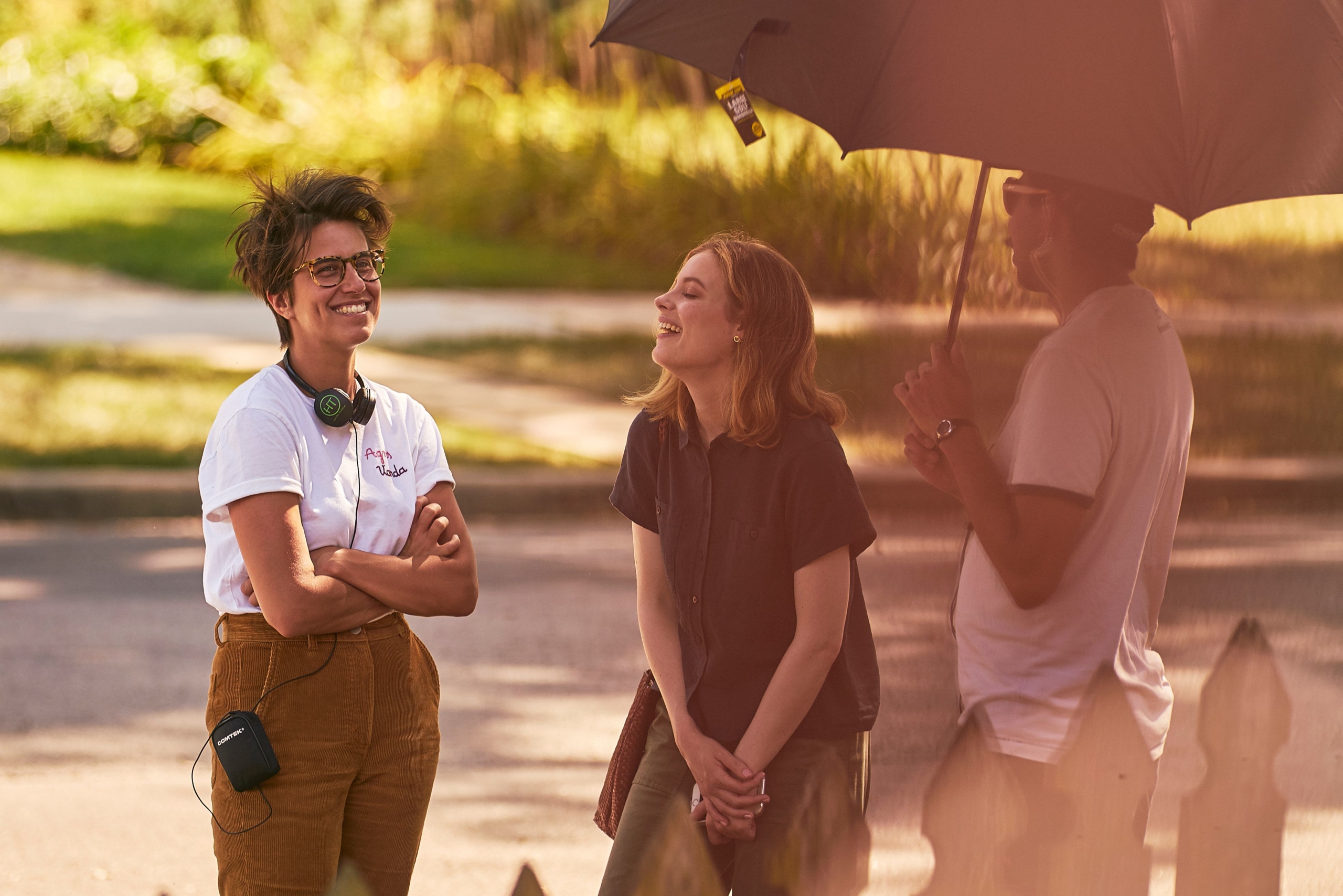
REY: It’s almost every day that you get to set, and someone’s like, “Hey, just so you know, actually, we’re not going to be able to shoot at this location. Or someone’s like, “I’m sorry, our AC is out,” or “We didn’t get enough extras. There were supposed to be 75, but there’s only 20,” and you’re just like, “What the fuck am I supposed to do”? It’s very, very rare that you had a plan, and it all goes according to plan, because there’s so many moving pieces. Do you remember when our equipment got stolen off the truck? We were in the middle of a scene. There’s lots of things that happen that you have to just overcome. Sometimes it’s just as simple as, “It’s going to rain.”
JACOBS: Isn’t it isolating when everyone is able to just have a fun lunch, and you’re sitting there with the weight of the whole movie on your shoulders?
REY: Horrible. And there’s nowhere to really hide.
JACOBS: You need to create a trailer of the mind, Kris. You can go to that trailer inside your head. What were you going to wear to the premiere at South By [Southwest]?
REY: Oh! I was going to wear this really cool black jumpsuit. I was like, “I can go to the premiere, and also, I could go to the dance party in this. This is my one-stop shop.” What did you have planned?
JACOBS: I hadn’t figured it out yet, but I wanted to wear vintage. There are some fashion collections from back in the day that I’m pretty obsessed with, and it’s sort of a goal of mine to get to wear clothes from that. I really wish I could wear something from the Alexander McQueen Spring/Summer 2005 collection.
REY: Whoa! 2005? That’s cool! I figured you were talking about decades ago. You’re just talking about 2005.
JACOBS: Well, in fashion, that’s considered vintage. Has there been one response to the film that’s really touched you or been meaningful?
REY: I keep getting these little messages on Instagram from people that I don’t know that are saying that they’ve seen the film and that it’s affected them. We’ve gotten really great reviews, and those have been awesome to read. I was very excited about the Peter Travers review in Rolling Stone, because he’s an icon. But what I feel like I’m really missing is the audience interaction that you get at a screening at a film festival. I love that Peter Travers liked the movie, but having a person who’s not a critic just watch the movie and be impacted by it—that’s what I’m making movies for.
JACOBS: I felt a similar reaction to that movie Don’t Think Twice that I was in that Mike Birbiglia made. It was very specifically about an improv troupe, but it touched on success and life and failure and everything. It was really cool to see the way it resonated with people from so many different professions. I do like that about that movie, and this movie, that they are about a person and their relationship to their work, and how vulnerable you need to be. I think that this movie will speak to a lot of different people in that same way.
REY: Well, it’s never on any checklist of “This is what you have to do to succeed.” There are plenty of performers and performances out there that don’t feel particularly vulnerable, but I have found that what I enjoy in art is vulnerability. But it’s scary. You’re letting yourself out, and you’re also, like, “What if I let myself out, and no one cares? What if I really talked about my real shit right now, and literally no one wants to hear it because they’re not interested?” It would be like if you were like, “Okay, I’m going to do this one-woman show. I’m going to talk about all the trauma in my life,” and no one shows up.
JACOBS: Yeah, but then, I guess, the counterpoint to it would be, “Why did you want to do it in the first place?” Part of it is to connect with an audience, but if you do feel that it’s worth doing, could it be worth doing even if no one shows up? And I don’t have an answer to that. I do think we make things for other people to see and enjoy. Well, people are seeing this one, so good job, Kris!
REY: Yay! This is not my one-woman show, but yes, people are seeing it, and it does feel really good. I mean, really, really good.
SARAH NECHAMKIN: Well, if you care about my opinion—
REY: We do.
NECHAMKIN: What stood out to me was how the film explores single womanhood, and the pressures that Kate is feeling as her friend is getting ready to have a baby. You have two kids, but you still painted such a real portrayal of that anxiety. Did that come from any sort of place in you?
REY: I had my first kid when I was 29, so that was much earlier than any of my friends. But I was the only person with a kid for years and years, and I have, obviously, so many friends that are women. And I think that there’s this very real period from your late twenties to your early forties—certainly your late thirties—where there’s a real anxiety in the air of, “Am I going to do this? Am I going to have kids? Am I not going to have kids? Am I going to meet someone that I can have kids with?” Part of what makes it such an anxious period is this acknowledgment that it also feels kind of archaic, and that you’re giving in to this role of the mother. There’s an internal struggle there, whether to just reject it completely or whether to give in to it, and if you do want to do it, how do you do it? It’s in the back of almost everyone’s head. Gillian, you can speak to this, I’m sure, but even if you’ve decided that you’re not having kids, people are constantly asking you whether or not you’re having kids.
JACOBS: Can confirm. I don’t have kids, and people ask me all the time if I’m going to have kids. But what I liked about this movie was that it’s certainly there, but it’s not the story of the film. I have a friend who’s an author and who also doesn’t have kids, and she took a screen grab of that shot of everybody at this baby shower, and then my character is holding the book. She said, “It’s me!”
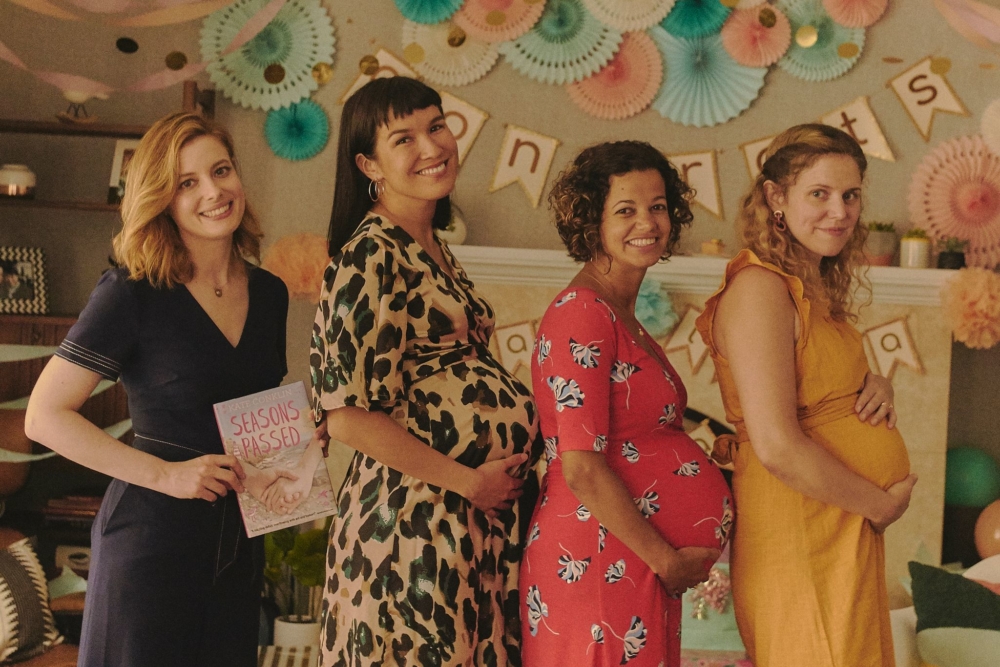
A still from I Used to Go Here.
I think that while this debate and this question is so central in everybody’s minds, collectively, I kind of liked that the journey of this character is much more about her being separated from everybody else in her life. You’ve created this scenario in which you get a taste of this woman in the context of her life and what it has been at the very beginning, and then you quickly take her out of that. And so she’s being forced to say, “Who am I as separate from all of that?” Nobody at this college knows anything about that, and I can pretend to be somebody that I’m not.
REY: With that shot of Kate with the book and all the other women that are pregnant, I always thought that was such a funny idea, but when it came to actually marketing the film, I was very careful not to use that shot, even though it’s one of the best stills we have. When we were submitting stuff to South by Southwest, I didn’t want people to see the still and think it’s a movie about a woman who wants to be pregnant like all of her other friends or something. That’s definitely not what it’s about.
NECHAMKIN: There was also the level of unconventional relationships examined in the film, whether they’re romantic or platonic, or both—like Tall Brandon and Hugo’s mother. I wasn’t really sure they were going to kiss…
REY: Yeah. None of us were sure they were going to kiss. I didn’t write it in the script. In the script, they just sort of look longingly at each other and shake hands, and you just get the sense they maybe fell in love or something. But then, on set, it just was so apparent that they should kiss. I went back and forth a little bit, but in the end, it’s just so nice. I think it all fits in with this line that Hugo says: “Just because a connection with a person doesn’t last forever, it doesn’t mean it isn’t real.” It’s so hard to know, after a breakup, what that meant, because often, when you end a relationship, it’s been not so great for a little while. And it’s hard to reckon with where it wound up versus where it began and what that all means. I don’t think you get the sense from this film that Tall Brandon and Hugo’s mom are going to stay together and get married or something. But you do think, “Wow, those are two people that had a connection. And that’s cool.”

